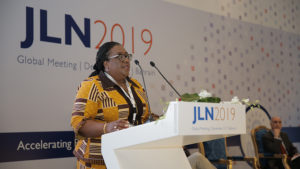Driving Further, Faster, and Together Toward Health for All
Implementing universal health coverage (UHC) within a country is no easy task. Health leaders and decision-makers face many challenges due to the complexity involved in restructuring an entire health system, and while progress has been made in many countries, like Peru and Thailand, the recent 2019 Global Monitoring Report ↗ highlighted just how much work remains globally. Although country contexts vary, there are opportunities where countries face similar challenges and can learn from other countries that have already resolved them.
Countries can use the Joint Learning Network for Universal Health Coverage (JLN) as a platform to collaborate, share, and learn from each other to make greater strides in their UHC reforms. The network’s country-led and country-driven approach ensures that our members identify their greatest areas of need and set the learning agenda accordingly. This unique approach means that when learning activities are formed, countries scope the challenges and topics, not donors or partners.

Dr. Lydia Dsane-Selby speaks on stage at the 2019 JLN Global Meeting. Photo: Photic Studio
At the JLN’s recent 2019 Global Meeting, Dr. Lydia Dsane-Selby, Chief Executive Officer of Ghana’s National Health Insurance Authority and a Co-Convenor of the JLN Steering Group, summed up the importance of the network’s approach and focus on practical knowledge, saying, “Theory doesn’t work, it’s joint learning that works.”
Keeping countries in the driver’s seat helps connect learning with practical application. As countries, co-produce solutions to their shared UHC challenges, they can gain greater insight into how to adapt and implement these “how-to’s” to overcome their own challenges.
For example, in November 2018, the network published the Vertical Integration Diagnostic and Readiness Tool, which was co-produced by experts from Indonesia, Malaysia, the Philippines, Sudan, and Vietnam. Since then, the tool has been adapted in Vietnam at the central-level and in two provinces, and in the Philippines, two provinces have similarly adapted and implemented the tool. With existing learning activities closing and three new learning activities launching, the network continues to respond to our country members’ UHC priorities.
2019 has been an important year for the global UHC movement. From political leaders recommitting to health for all at the United Nations High-level Meeting on Universal Health Coverage in September to multilateral organizations launching a Global Action Plan ↗ to “engage, accelerate, account, and align,” there is clear interest in transforming the global health infrastructure to support UHC. However, policymakers and practitioners in individual countries will be the ones responsible for keeping the promise. This was true in 2018 and will remain so in 2020, and it underscores why the decisions that countries make will determine what happens next. Since the JLN’s founding with 6 members to our 34 members today, the network has always believed that the road to achieving UHC starts with countries learning from each other to drive further, faster, and together toward health for all.
Learn more about Universal Health Coverage Day 2019 on the official website ↗.
